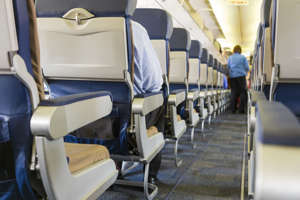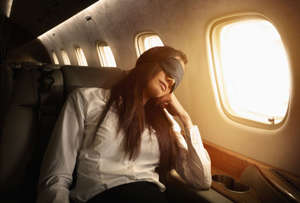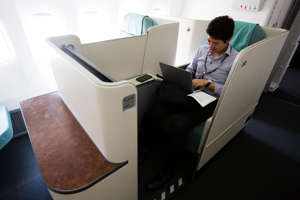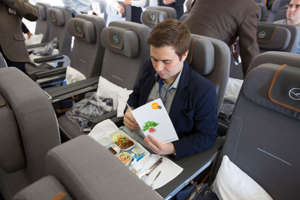12 Things You Should Never Do on Airplanes
 Cosmopolitan
12 hrs ago
Cosmopolitan
12 hrs ago
 © REX/WestEnd61
Airplane interior
You already know what not to do on a plane if you don't want to be a
giant jerk. (Exhibit A: Man watching iPad movie without headphones.
Exhibit B: Woman eating pungent tuna wrap.)
© REX/WestEnd61
Airplane interior
You already know what not to do on a plane if you don't want to be a
giant jerk. (Exhibit A: Man watching iPad movie without headphones.
Exhibit B: Woman eating pungent tuna wrap.)
But
best practices can be less obvious for considerate humans who just want
to make it from point A to point B safely. If you're one of these
people, avoid these behaviours the next time you fly:
1. Sleeping through takeoff or landing
When
the plane ascends or descends, the air pressure around you changes
faster than the air inside your ears. If you've ever flown before, you
know this can be super uncomfortable — but only temporarily. To equalise
the pressure, all you need to do is chew gum; inhale, then exhale
gently as you hold your mouth and nose shut; suck on candy; or yawn,
according to MedlinePlus. In other words, you're better off awake.
Accidentally sleep through the pressure change, and this condition will
only get more uncomfortable, potentially instigating dizziness, ear
infection, slight hearing loss, eardrum damage, or nosebleeds and severe
hearing loss in the worst of cases.
 © Colin Anderson/Blend Images/Corbis
2. Dozing off when it's daytime at your final destination
© Colin Anderson/Blend Images/Corbis
2. Dozing off when it's daytime at your final destination
Because
this will make it harder to adjust to the time zone you're traveling
to, it's a surefire way to screw yourself over. Instead, change your
watch to reflect the time zone of wherever it is you're going as soon as
you board the plane, recommends the National Sleep Foundation. Then
adjust your activities accordingly: If your watch says it's bedtime, go
ahead and shut your eyes. Otherwise, open up and face the day! (Even if
it's dark out.)
 © Photographer: SeongJoon Cho/Bloomberg
3. Sitting from takeoff to landing
© Photographer: SeongJoon Cho/Bloomberg
3. Sitting from takeoff to landing
Low
air pressure in the cabin can slow your circulation and set you up for
blood clots, particularly in the legs. Sitting around doesn't help —
especially if you're on birth control pills, because some can increase
your risk of developing dangerous clots (even without air travel).To
reduce your risk of developing clots, which could pose major health
issues if they travel to your lungs, brain, or heart, the
CDC suggests getting up and moving around as often as possible. Of
course that's easier said than done for lazies and people sitting in
window or middle seats — it's all the more reason to choose an aisle
seat when you can. Regardless of where you're seated, you can protect
yourself by performing these exercises every so often (there aren't hard
and fast guidelines on how frequently you should do them): Raise your
heels while your toes are on the floor; raise your toes while your heels
on the floor; and clench and release your leg muscles. Repeat each move
a handful of times before moving on to the next, and repeat the entire
series periodically throughout your flight. And if you zonk out on a
red-eye? Just try to shift positions as often as possible, and move your
legs anytime you're awake enough to think of it.
(Some experts recommend against taking sleeping pills, lest they render
you even more immobile.)
4. Fussing with your seat belt
The Today show
investigators also found that seat belts were pretty icky — they, too,
were covered with potentially harmful bacteria. While strapping in is
obviously your only option and you should definitely do it, avoid touching the strap after you fasten it, and put your hand sanitiser to use after buckling in.
5. Walking around barefoot
Sure,
it's nice to make yourself feel right at home in-flight — particularly
when you're in the air for hours or you fly overnight. However, former
flight attendants say the floor can be positively filthy — and anyone
with eyeballs can confirm that. Lurking trash and food debris should be
reason enough to keep your shoes on — or at least slip them on for
bathroom runs.
 © Alex Wong/Getty Images News
6. Declining a beverage
© Alex Wong/Getty Images News
6. Declining a beverage
Cabin
air is notoriously dry. Because your body loses moisture every time you
exhale, simply breathing at high altitudes can dehydrate you. So when
the flight attendant rolls up, place an order and request refills on the
regular.
7. Boozing it up
While
alcohol might initially help you fall asleep on a flight, it can
ultimately mess with your sleep quality, dehydrate you, and trigger a
lingering hangover that makes you irritable and lethargic. Lay off the
liquor until you're back on the ground to arrive on your A-game.
 © Fred Ramage/Keystone/Getty Images
8. Ordering tea or coffee
© Fred Ramage/Keystone/Getty Images
8. Ordering tea or coffee
Never
mind the fact that in-flight coffee is an insult to the beverage.
Coffees and teas are made from plane tap water that could contain
coliform, bacteria found in 12 percent of commercial airplanes,
according to a 2012 Environmental Protection Agency report. As long as
your immune system is up to snuff, the stuff won't necessarily make you
sick. But because coliform comes from feces, where harmful bacteria also
lurk, water that contains it is more likely to harbour scarier stuff
like E. coli, which can really mess with your system. So don't risk it:
Opt for bottled water, instead — and hold the ice if it's made with
plane tap water. (Just ask an attendant.)
9. Drinking anything with bubbles
Changes
in air pressure can cause gas in the body to expand as much as 25
percent, according to an Aerospace Medical Association report. Because
bubbly beverages do the same thing they can exacerbate these
uncomfortable effects. Skip them to feel less bloated when you land.
 © Martin Leissl/Bloomberg
10. Bingeing on plane food
© Martin Leissl/Bloomberg
10. Bingeing on plane food
Of
course you should eat when you're hungry — whether you're on a plane or
elsewhere. But polish off all the in-flight food just because you're
bored, and you'll enjoy it less than you would on the ground: Dry cabin
air and low air pressure can reduce your ability to perceive salty and
sweet tastes by 15 to 30 percent — which can make foods taste worse when
you eat it in the air, according to a German study. All the noise from
the airplane engine doesn't help either, according to a Cornell
University study that confirms the obvious: Environmental distractions
can affect your sense of taste. Some airlines compensate for the
ambiance by serving saltier foods, so you could end easily end up
overdoing it on sodium.
11. Eating food after it falls on your tray table.
When the Today show's
investigative team swabbed random surfaces for germs during three
different cross-country plane trips on separate airlines, guess where
they found the highest levels of harmful bacteria, across the board? On
plane tray tables. Flight attendants blame those passengers that use
their trays as baby-changing tables. (And you know better than to eat
off one of those.) While ground crews are supposed to wipe down trays
between flights, you never really know how well they get in there. Give
the surface a once-over yourself using an antibacterial wipe, or hand
sanitiser and a napkin. Skip this step, and you're better off
sacrificing the peanut that graced your tray.
12. Holding it in until you get there.
Unless
you regularly relieve yourself in some hole in the woods, using the
plane potty probably won't be the highlight of your trip. But if you
feel the urge to pee while you're in the air, just suck it up and use
the bathroom. Otherwise, your urine will hang around in the bladder
where it can trigger an infection — and really make vacationing a pain.

No comments:
Post a Comment